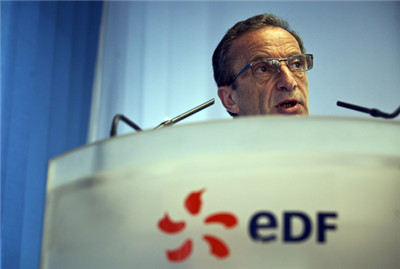(单词翻译:单击)
The idea of taking 10 weeks holiday a year sounds unreal to the average American worker. The French energy giant EDF, however, has tens of thousands of employees entitled to this perk. It wants 30,000 of them to scale back their vacations to a more modest 27 days and is offering to buy them out with a one-off 10,000 payment for lower-paid workers and a 4-6 per cent pay rise for managers.
在普通美国劳动者看来,一年享有10周假期听起来很不切实际。然而,法国能源巨头法国电力(EDF)的数万员工都享有这项福利。该公司希望其中的3万名员工能将自己的假期天数缩减至较为适度的27天,它愿为此提供经济补偿,也就是向薪酬较低的员工一次性支付1万欧元、并为管理层加薪4%至6%。
In the words of EDF’s group strategy director Philippe Torrion: “We cannot be out of step with the world.” Many other French companies seem to have no problem with being out of step — and offer almost two months of holiday a year as standard.
用该公司集团战略总监菲利普•托里翁(Philippe Torrion)的话来说,就是“我们不能与世界脱轨”。其他很多法国企业似乎不觉得脱轨有什么问题——它们每年提供的假期普遍接近两个月。

Why? Well, French people — including French bosses — love holidays. Outside the tourism sector, it is often hard to find anyone working in a French office in August, or even for long periods in May — many workers took the chance last month to “bridge the gap” between the many public holidays
为什么会这样?这个嘛,法国人——包括法国老板——热爱假期。除旅游业外,8月份时往往很难在法国的办公室里找到还在工作的人,甚至5月份也有很长的时间找不到人——不少员工上月借机把很多公众假日(5月1日、5月8日、5月14日和5月25日)“串起来”休掉了。
(May 1, May 8, May 14 and May 25).
到底是钱多点更重要,还是空闲时间多点更重要,这在法国可是个大问题。正是这个问题加剧了围绕每周35小时工作制(2000年在法国推行)的激烈争论。时不时会有一些人把35小时工作制视为促进就业的方法(如果人们工作时间短了,则需要设立更多的工作岗位)。其他人则将之视为对就业灵活性的严厉束缚和对雇佣新员工的阻碍。
The question of which is more important — more money or more free time — is a big one in France. It is this question that fuels the intense debate about the 35-hour working week, which was implemented in France in 2000. Some people, then and now, saw the trente-cinq as a way to boost employment (if people work fewer hours, more jobs will be needed). Others view it as a rigid brake on employment flexibility and a disincentive to hire new workers.
1992年至2005年,我曾在法国电力任经济师,当时我并未看到有很多同事在努力工作。至少,那些足够幸运的、拥有长期合同的同事不怎么努力。当然,这些员工就是那些每年享有10周假期的人。
As an economist for EDF between 1992 and 2005, I did not see many of my fellow employees working hard. At least, not those who were lucky enough to have a permanent contract. These employees are, of course, the people who have 10 weeks holiday a year.
在法国,我们有两类员工。一类员工拥有一份稳定的工作,即“无固定期限合同”;另一类就是其余所有人。后者包括临时工、实习生和分包人。如今在法国,很少有人被录用时签的是长期合同(一旦拿到无固定期限合同,公司就很难解雇他们)。固定期限合同正日益成为通行做法,80%被录用的人签的是这种合同。
In France, we have two categories of worker. First, there are those who have a stable job, known as a CDI (contrat à durée indéterminée); then there is everyone else. This latter group includes temporary workers, interns and subcontractors. Few people in France are now being hired on permanent contracts (once someone is on a CDI, it is very hard to fire them). Fixed-term contracts are increasingly the norm, accounting for 80 per cent of hires[chking with author - NOT QUITE SURE WHAT THIS MEASURES? 80% OF PEOPLE WITH A JOB? 80% OF THOSE TAKEN ON ARE GIVEN A FIXED TERM CONTRACT? ] . (‘three third of the hiring’ - could you express this as a percentage as I am not quite following what the figure is?)
对法国电力员工来说,这种企业主体身份眼下变得更加令人垂涎。它有令人羡慕的工作保障、超棒的养老金计划以及长长的假期。在法国电力工作被视为一种特权;很多家长都梦想着可以吹嘘自己的孩子在法国电力拥有一份长期职位。
For EDF employees, the status of agent is now all the more coveted. There is enviable job security and an excellent pension scheme as well as the long holidays. It is considered a privilege to work there; many parents dream of being able to boast that their child has a permanent position at the company.
实际的工作往往平淡无奇,尽管这其实无关紧要。当我在法国电力工作时,我看到同事们花费很多时间从事一些不那么重要的活动,比如努力了解公司组织架构(像个迷宫),谋划争取到更好的职位(工作更少、钱更多、威望更高的职位),悄无声息地损害潜在竞争对手的晋升前景,做事情神神秘秘、好像自己是一个在执行任务的间谍(“透明”仿佛是个亵渎之辞)。
The actual jobs are often unexciting — although that doesn’t really matter. When I was at EDF I saw colleagues spend a lot of time on ancillary activities, such as trying to understand how the company is organised (like a maze); plotting to secure a better position (one with less work, more money and greater prestige); harming the prospects of potential rivals for promotion without their efforts being noticed; and practising secrecy as if they were spies on a mission (transparency seems to be a swear word).
说法国人懒惰是不对的。事实是一些人有资本懒惰,而其余的人——就业较没保障的那些人——每周工作时间不得不远远超过35个小时。现代法国的某些方面仍像凡尔赛时期一样:如今的贵族是那些有铁饭碗的人。当然,其中有些人工作努力,但很多人并非如此。毕竟,大多数人无法被炒掉。这些高贵的精英所享有的特权,尚未像1789年法国大革命所承诺的那样被废除。
It is not true to say that French people are lazy. The truth is that some are able to afford laziness, while the rest — the less securely employed — have to work many more than 35 hours a week. Modern France still has some Versailles-like aspects: the aristocrats of today are those with secure jobs. Of course, some of them work hard but many do not. Most cannot be fired, after all. The end of privileges for these entitled elites, as promised by the revolutionaries of 1789, has not happened yet.
坦白地说,当我是法国电力的一名(工作有保障的)员工时,我永远都不会接受任何旨在缩减我假期长度的经济补偿。正如我们法语所说的:“假期神圣不可侵犯(Les vacances, c’est sacré)。”如今我是一名自由职业者,甚至在放假的时候也在工作。有时我会怀念过去的美好时光。就像埃迪特•皮亚夫(Edith Piaf)所唱的:“一切都会逝去(Tout fout le camp)。”好时光一去不返了。


